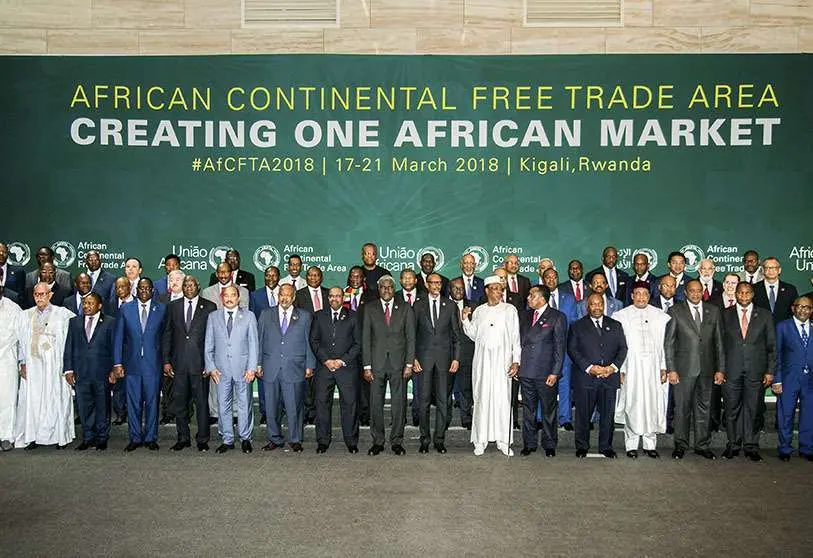Coronavirus delays implementation of major African free trade agreement

The African Continental Free Trade Agreement (AfCFTA), which aims to create the world's largest barrier-free trade zone, will not be able to start functioning on the scheduled date of July 1 because of the coronavirus, a setback that adds uncertainty to Africa's most ambitious integration plan.
The beginning of the operational phase of the treaty was outlined this year as the star event in the political agenda of the African Union (AU), but the COVID-19 pandemic that has the planet on edge has stopped the project's take-off in its tracks.
"The date (for the start) of trade, set for July 1, must be postponed," AfCFTA Secretary General Wamkele Mene, who was sworn in on March 19, became the first to hold the newly created post designed by the AU to make the agreement operational, told Efe.
"The priority, for the moment, should be to fight the pandemic, the priority should be to save lives," Mene said by phone from the African Union headquarters in Addis Ababa, where he is waiting for a re-opening of the borders closed because of the coronavirus to relocate to his office in Ghana. According to the Secretary-General, there is now an urgent need to "give governments space to address this unprecedented public health crisis" and, once the virus is "defeated", they can "refocus on trade objectives".
It is expected that in the coming weeks "the heads of state will determine another new date," because "they are aware of the uncertainty associated with not having a clear date," Mene said. The AU Commission "has proposed 1 January 2021 as the new tentative date for the start of trade under AfCFTA," the trade coordinator of the United Nations Economic Commission for Africa (UNECA), David Luke from Sierra Leone, told Efe.
"The COVID-19 crisis has inevitably impacted on AfCFTA implementation. Negotiations have been suspended to complete some pending technical elements, such as rules of origin - products made in Africa - for some sensitive sectors, the exchange of tariff concessions on trade in goods and commitments on trade in services," Luke explained. In fact, the epidemic has led to the cancellation of a special AU summit that South Africa, which this year holds the rotating presidency of the continental organization, had scheduled for May in order to close those loopholes.
Numerous voices had been raised in recent weeks on the continent in favour of delaying the start of trade under the treaty, such as former Nigerian Foreign Minister Bolaji Akinyemi, who recommended a "twelve-month wait" because "all the factors that underpin AfCFTA are in suspension".
To date, the pandemic has not punished the continent with the fury seen in other areas of the world, such as Europe or the Americas, as there have been just over X deaths and X infections in a population of over 1.2 billion people.
However, the drastic measures imposed by governments to contain the spread of the coronavirus, such as confinement or the closure of businesses that pose a risk to public health, have minimised economic activity. As the coordinator of the CUTS International think tank in Ghana, Appiah Kusi Adomako, explained to Efe, "Most of the land and air borders have been closed. You can't do cross-border trade with closed borders.
Apart from the difficulty of trading remotely, the pandemic threatens to devastate the continent's economies because of the lower demand from African trading partners such as the US, the European Union (EU) or China, which have been hit hard by the virus; the lower cost of African exports and the disruption of supply chains. Given this panorama, UNECA, based in Addis Ababa, has lowered its forecast for growth in Africa's Gross Domestic Product (GDP) for this year from 3.2% to 1.8% due, in the words of its executive secretary, Cameroon's Vera Songwe, to the "sudden shock" that is shaking the economies.

So far, 54 of the 55 AU member states have signed the treaty (Eritrea has yet to sign), which came into force on 30 May, and around 30 countries have ratified the pact. The AfCFTA aims to establish the largest unhindered trade area in the world since the founding of the World Trade Organization (WTO) in 1995, with a market of more than 1.2 billion people - expected to grow to 2.5 billion by 2050 - and a combined GDP of some 3.4 trillion dollars.
According to Luke, the treaty "has now become more important to Africa's recovery" once the light at the end of the pandemic tunnel is seen, but beyond the current crisis there are still significant challenges ahead, such as meeting the target of eliminating tariffs on 90% of products, which may still take years.
Before the global epidemic, when the protectionist echoes promoted by the United States of President Donald Trump rang out loud, the African continent was already a champion of multilateral trade, a position defended by powers such as the EU.
"We have become the champions of multilateralism," reiterated Wamkele Mene, assuring that Africa, when the pandemic is over, will embrace AfCFTA "with more energy and the same determination as before".








